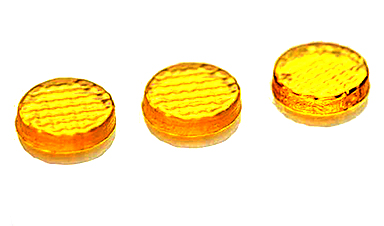A new technique for 3D printing medication has enabled the printing of multiple drugs in a single tablet, paving the way for personalized pills that can deliver timed doses.
Researchers from the University of Nottingham’s, Centre for Additive Manufacturing have led research alongside the School of Pharmacy that has fabricated personalized medicine using Multi-Material InkJet 3D Printing (MM-IJ3DP). The research has been published in Materials Today Advances.
The team have developed a cutting-edge method that enables the fabrication of customized pharmaceutical tablets with tailored drug release profiles, ensuring more precise and effective treatment options for patients.
Using Multi-Material InkJet 3D Printing (MM-IJ3DP), tablets can be printed that release drugs at a controlled rate, determined by the tablet‘s design. This is made possible by a novel ink formulation based on molecules that are sensitive to ultraviolet light. When printed, these molecules form a water-soluble structure.
The drug release rate is controlled by the unique interior structure of the tablet, allowing for timing the dosage release. This method can print multiple drugs in a single tablet, allowing for complex medication regimens to be simplified into a single dose.
Dr. Yinfeng He, Assistant Professor in the Faculty of Engineering’s Centre for Additive Manufacturing led the research, he said, “This is an exciting step forwards in the development of personalized medication. This breakthrough not only highlights the potential of 3D printing in revolutionizing drug delivery but also opens up new avenues for the development of next-generation personalized medicines.”
“While promising, the technology faces challenges, including the need for more formulations that support a wider range of materials. The ongoing research aims to refine these aspects, enhancing the feasibility of MM-IJ3DP for widespread application,” Professor Ricky Wildman added.
This technology will be particularly beneficial in creating medication that needs to release drugs at specific times, making it ideal for treating diseases, where timing and dosage accuracy are crucial. The ability to print 56 pills in a single batch demonstrates the scalability of this technology, providing a strong potential for the production of personalized medicines.
Professor Felicity Rose at the University of Nottingham’s School of Pharmacy was one of the co-authors on the research, she says, “The future of prescribed medication lies in a personalized approach, and we know that up 50% of people in the UK alone don’t take their medicines correctly and this has an impact on poorer health outcomes with conditions not being controlled or properly treated. A single pill approach would simplify taking multiple medications at different times and this research is an exciting step towards that.”
More information: Geoffrey Rivers et al, Enabling high-fidelity personalised pharmaceutical tablets through multimaterial inkjet 3D printing with a water-soluble excipient, Materials Today Advances (2024). DOI: 10.1016/j.mtadv.2024.100493
Provided by University of Nottingham
News
These two viruses may become the next public health threats, scientists say
Two emerging pathogens with animal origins—influenza D virus and canine coronavirus—have so far been quietly flying under the radar, but researchers warn conditions are ripe for the viruses to spread more widely among humans. [...]
COVID-19 viral fragments shown to target and kill specific immune cells
COVID-19 viral fragments shown to target and kill specific immune cells in UCLA-led study Clues about extreme cases and omicron’s effects come from a cross-disciplinary international research team New research shows that after the [...]
Smaller Than a Grain of Salt: Engineers Create the World’s Tiniest Wireless Brain Implant
A salt-grain-sized neural implant can record and transmit brain activity wirelessly for extended periods. Researchers at Cornell University, working with collaborators, have created an extremely small neural implant that can sit on a grain of [...]
Scientists Develop a New Way To See Inside the Human Body Using 3D Color Imaging
A newly developed imaging method blends ultrasound and photoacoustics to capture both tissue structure and blood-vessel function in 3D. By blending two powerful imaging methods, researchers from Caltech and USC have developed a new way to [...]
Brain waves could help paralyzed patients move again
People with spinal cord injuries often lose the ability to move their arms or legs. In many cases, the nerves in the limbs remain healthy, and the brain continues to function normally. The loss of [...]
Scientists Discover a New “Cleanup Hub” Inside the Human Brain
A newly identified lymphatic drainage pathway along the middle meningeal artery reveals how the human brain clears waste. How does the brain clear away waste? This task is handled by the brain’s lymphatic drainage [...]
New Drug Slashes Dangerous Blood Fats by Nearly 40% in First Human Trial
Scientists have found a way to fine-tune a central fat-control pathway in the liver, reducing harmful blood triglycerides while preserving beneficial cholesterol functions. When we eat, the body turns surplus calories into molecules called [...]
A Simple Brain Scan May Help Restore Movement After Paralysis
A brain cap and smart algorithms may one day help paralyzed patients turn thought into movement—no surgery required. People with spinal cord injuries often experience partial or complete loss of movement in their arms [...]
Plant Discovery Could Transform How Medicines Are Made
Scientists have uncovered an unexpected way plants make powerful chemicals, revealing hidden biological connections that could transform how medicines are discovered and produced. Plants produce protective chemicals called alkaloids as part of their natural [...]
Scientists Develop IV Therapy That Repairs the Brain After Stroke
New nanomaterial passes the blood-brain barrier to reduce damaging inflammation after the most common form of stroke. When someone experiences a stroke, doctors must quickly restore blood flow to the brain to prevent death. [...]
Analyzing Darwin’s specimens without opening 200-year-old jars
Scientists have successfully analyzed Charles Darwin's original specimens from his HMS Beagle voyage (1831 to 1836) to the Galapagos Islands. Remarkably, the specimens have been analyzed without opening their 200-year-old preservation jars. Examining 46 [...]
Scientists discover natural ‘brake’ that could stop harmful inflammation
Researchers at University College London (UCL) have uncovered a key mechanism that helps the body switch off inflammation—a breakthrough that could lead to new treatments for chronic diseases affecting millions worldwide. Inflammation is the [...]
A Forgotten Molecule Could Revive Failing Antifungal Drugs and Save Millions of Lives
Scientists have uncovered a way to make existing antifungal drugs work again against deadly, drug-resistant fungi. Fungal infections claim millions of lives worldwide each year, and current medical treatments are failing to keep pace. [...]
Scientists Trap Thyme’s Healing Power in Tiny Capsules
A new micro-encapsulation breakthrough could turn thyme’s powerful health benefits into safer, smarter nanodoses. Thyme extract is often praised for its wide range of health benefits, giving it a reputation as a natural medicinal [...]
Scientists Develop Spray-On Powder That Instantly Seals Life-Threatening Wounds
KAIST scientists have created a fast-acting, stable powder hemostat that stops bleeding in one second and could significantly improve survival in combat and emergency medicine. Severe blood loss remains the primary cause of death from [...]
Oceans Are Struggling To Absorb Carbon As Microplastics Flood Their Waters
New research points to an unexpected way plastic pollution may be influencing Earth’s climate system. A recent study suggests that microscopic plastic pollution is reducing the ocean’s capacity to take in carbon dioxide, a [...]





















